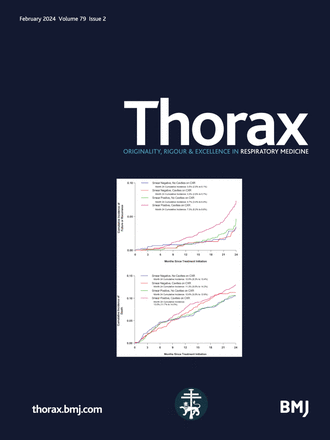Effect of simvastatin on postoperative complications in patients undergoing one-lung ventilation during surgery: the Prevention HARP-2 randomised controlled trial
IF 7.7
1区 医学
Q1 RESPIRATORY SYSTEM
引用次数: 0
Abstract
Rationale Surgeries that require one-lung ventilation have high rates of postoperative cardiopulmonary complications with associated morbidity and mortality. Statins may limit inflammation involved in the development of these complications. Objectives We tested the hypothesis that perioperative simvastatin use reduces postoperative cardiopulmonary complications, compared with placebo, in surgery requiring one-lung ventilation. Methods Randomised, double-blind, multicentre trial of simvastatin versus placebo in patients undergoing elective oesophagectomy, lobectomy or pneumonectomy at 15 sites throughout the UK. Planned sample size is 452 patients. Participants were randomised to either simvastatin 80 mg or placebo for 4 days preoperatively and up to 7 days postoperatively. Measurements The primary outcome measure was a composite endpoint of the incidence of acute respiratory distress syndrome, postoperative pulmonary complications, myocardial infarction and/or myocardial ischaemia during the first 7 days postoperatively or until hospital discharge. A modified intention-to-treat analysis excluded patients who did not receive the intervention preoperatively or proceed with the planned surgery. Main results 251 patients were randomised, 126 assigned to simvastatin and 125 to placebo, with 208 included in the modified intention-to-treat population. The trial was stopped early because of futility following recommendations from the data monitoring and ethics committee. The primary outcome occurred in 45/106 patients (42.5%) in the simvastatin group and 39/102 patients (38.2%) in the placebo group (OR 1.19 (95% CI 0.68 to 2.08); p=0.54). Secondary and safety outcomes were similar between the groups. Conclusion In patients undergoing one-lung ventilation, simvastatin did not reduce the incidence of postoperative cardiopulmonary complications. Trial registration number isrctn.org identifier, [ISRCTN48095567][1]. Data are available upon reasonable request. [1]: /external-ref?link_type=ISRCTN&access_num=ISRCTN48095567辛伐他汀对手术中单肺通气患者术后并发症的影响:预防HARP-2随机对照试验
理由:需要单肺通气的手术有很高的术后心肺并发症和相关的发病率和死亡率。他汀类药物可以限制这些并发症的炎症发展。目的:与安慰剂相比,在需要单肺通气的手术中,围手术期使用辛伐他汀可以减少术后心肺并发症。方法:随机、双盲、多中心试验辛伐他汀与安慰剂在英国15个地点进行选择性食管切除术、肺叶切除术或全肺切除术的患者。计划样本量为452例。参与者在术前4天和术后7天随机接受辛伐他汀80mg或安慰剂治疗。主要结局指标是术后7天或出院前急性呼吸窘迫综合征、术后肺部并发症、心肌梗死和/或心肌缺血发生率的复合终点。一项改进的意向治疗分析排除了术前未接受干预或未进行计划手术的患者。主要结果:251名患者被随机分组,126名患者接受辛伐他汀治疗,125名患者接受安慰剂治疗,其中208名患者被纳入意向治疗改良组。根据数据监测和伦理委员会的建议,该试验因无效而提前停止。主要结局发生在辛伐他汀组45/106例患者(42.5%)和安慰剂组39/102例患者(38.2%)(OR 1.19 (95% CI 0.68 ~ 2.08);p = 0.54)。两组间的次要和安全性结果相似。结论在单肺通气患者中,辛伐他汀不能降低术后心肺并发症的发生率。试验注册号isrctn.org标识符,[ISRCTN48095567][1]。如有合理要求,可提供资料。[1]: / external-ref吗?link_type = ISRCTN&access_num = ISRCTN48095567
本文章由计算机程序翻译,如有差异,请以英文原文为准。
求助全文
约1分钟内获得全文
求助全文
来源期刊

Thorax
医学-呼吸系统
CiteScore
16.10
自引率
2.00%
发文量
197
审稿时长
1 months
期刊介绍:
Thorax stands as one of the premier respiratory medicine journals globally, featuring clinical and experimental research articles spanning respiratory medicine, pediatrics, immunology, pharmacology, pathology, and surgery. The journal's mission is to publish noteworthy advancements in scientific understanding that are poised to influence clinical practice significantly. This encompasses articles delving into basic and translational mechanisms applicable to clinical material, covering areas such as cell and molecular biology, genetics, epidemiology, and immunology.
 求助内容:
求助内容: 应助结果提醒方式:
应助结果提醒方式:


